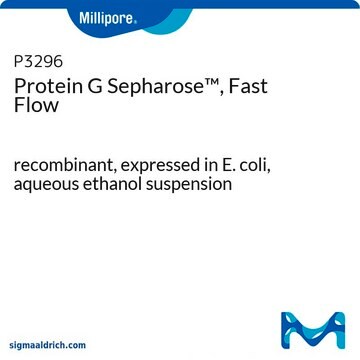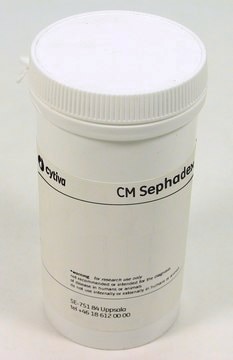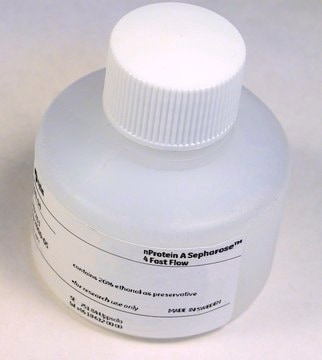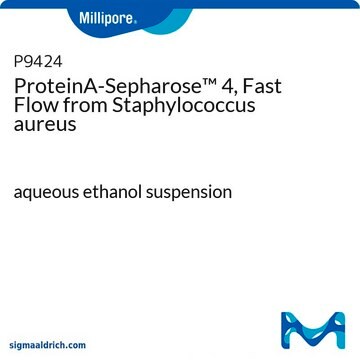GE17-0618-05
Protein G Sepharose™ 4 Fast Flow
Cytiva 17-0618-05, pack of 200 mL
Synonyme(s) :
Fast Flow resin, Antibody purification resin, IgG purification resin
About This Item
Produits recommandés
ligand
recombinant protein G lacking albumin-binding region
Conditionnement
pack of 200 mL
Fabricant/nom de marque
Cytiva 17-0618-05
Conditions de stockage
(20% Ehtanol)
Matrice
4% cross-linked agarose
Diamètre moyen
90 μm (d50v)
cleaning in place
2-10
working range
3-9
Adéquation
suitable for bioprocess medium
Température de stockage
2-8°C
Description générale
Protein G Sepharose™ 4 Fast Flow has recombinant protein G immobilized by the cyanogen bromide (CNBr) method to Sepharose™ 4 Fast Flow. Protein G exhibit binding specificities that complement Protein A media and binds to the Fc region of IgG from a variety of mammalian species. Protein G Sepharose™ 4 Fast Flow may be used to isolate and purify classes, subclasses and fragments of immunoglobulins from any biological fluid or cell culture medium.
As member of the BioProcess media range, Protein G Sepharose™ 4 Fast Flow meets industrial demands with security of supply and comprehensive technical and regulatory support.
Caractéristiques et avantages
- Binding specificities that complement Protein A media.
- Binds a broad range of IgG species and subclasses.
- Multi-point attachment minimizes ligand leakage.
- Used in a range of research applications.
Stockage et stabilité
Remarque sur l'analyse
Informations légales
Mention d'avertissement
Warning
Mentions de danger
Conseils de prudence
Code de la classe de stockage
3 - Flammable liquids
Certificats d'analyse (COA)
Recherchez un Certificats d'analyse (COA) en saisissant le numéro de lot du produit. Les numéros de lot figurent sur l'étiquette du produit après les mots "Lot" ou "Batch".
Déjà en possession de ce produit ?
Retrouvez la documentation relative aux produits que vous avez récemment achetés dans la Bibliothèque de documents.
Les clients ont également consulté
Notre équipe de scientifiques dispose d'une expérience dans tous les secteurs de la recherche, notamment en sciences de la vie, science des matériaux, synthèse chimique, chromatographie, analyse et dans de nombreux autres domaines..
Contacter notre Service technique










